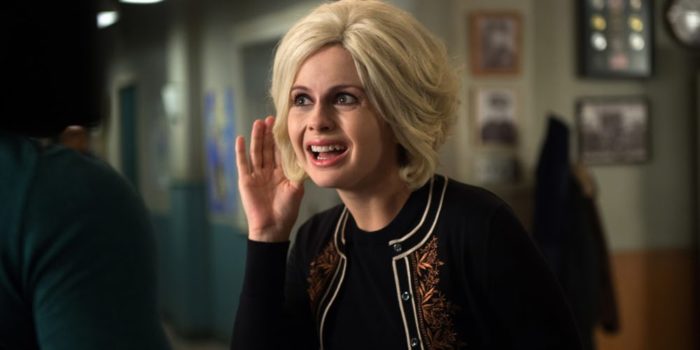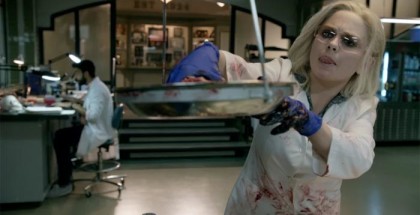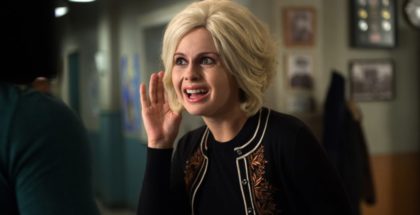UK TV review: iZombie Season 4 (spoilers)
Review Overview
First half
8Second half
4Tone
4.5Mark Harrison | On 17, Jun 2018
Warning: This review contains spoilers for Seasons 1 to 3 and minor spoilers for Season 4 – scroll to the bottom for more in-depth observations about the whole season.
“You’re just lucky I have a soft spot for dark, repetitive humour.”
Despite being loosely based on a Vertigo title, and having arty interstitials at the top of each act since the beginning, it’s taken until Season 4 for iZombie to really feel like a comic book show. Having worked as a fun, if unusually grisly, zombie-apocalypse-meets-police-procedural show up to this point, this season plays as a dystopian comic-book thriller, complete with a rogues’ gallery of characters with names like Brother Love and Renegade, while also launching into a scathing treatise on both state and religion. To say the results are uneven feels like an understatement.
To recap the events of the first two episodes (which we reviewed here), Seattle is now walled off from the rest of America, and is sent meagre supplies of brain donations, while the government figures out whether they should nuke the place. Inside New Seattle, life goes on, but allegiances change between our lead cast all the way through the rest of the season.
Veering off the premise of medical examiner Liv Moore (Rose McIver) and her partner, Clive Babineaux (Malcolm Goodwin), solving crimes using Liv’s zombie powers, but this is a season-long story about the very real problem of brain shortages, which has led paramilitary outfit Filmore Graves to declare the creation of new zombies a capital offence.
In a city where humans and zombies are supposed to co-exist, numerous factions spring up on both sides, with the rest of the regular cast – Major (Robert Buckley), Ravi (Rahul Kohli), Peyton (Aly Michalka), and the opportunistic Blaine (David Anders) – all landing in different positions. There’s a lot to get through in this season, and often, not a lot of time to get through it.
The fun procedural stuff is still present and correct, but Season 4 is ambitious with its drama, and it’s only in a harrowing scene at the end of Episode 5, Goonstruck, that we first see how ambitious. It’s a sequence that plays like a nightmare, with several major players pushed to their limits in order to get here, and it shows the hitherto unseen breadth of tones that the show can now encompass.
Right away, that’s underlined in the very next episode, My Really Fair Lady, a show-stopping comedic highlight of the season that opens with a cameo from Crazy Ex-Girlfriend’s Rachel Bloom. It’s off-formula, but it finds a balance between the goofy charm of McIver playing up her inner prima donna and the darker direction that the season is taking.
Sadly, the show can’t sustain it for much longer than that. The back-half of the season is a frustrating, tonally jumbled run of episodes, which courts the moral complexity of the show’s new world order admirably, but fumbles a lot in terms of narrative coherence. In juggling human smuggling by Renegade and her coyotes, anti-zombie hate crimes by humans, corruption within Filmore Graves, the emergence of the aforementioned Brother Love and his cult, the show always feels breathless.
If you’re generally onboard with iZombie, this is most clearly seen in Episode 9, Mac-Liv-Moore, which is the nadir of the season (and frankly, of the show so far) and yet still has loads of good stuff in it. There’s no slouch, but the episode is drastically over-stuffed, even without the utter irrelevance of Liv being on rapper brain. McIver is always good at providing this sort of comic relief, but she feels marooned in a dark part of the season that could have got far more tension out of her not eating a brain at all.
Outside of McIver’s usual excellence, the season’s most valuable players are the ones who get the most human mileage out of the new situation. Goodwin’s Clive is incredibly sympathetic, as he struggles first with the difficulties of being in a relationship with zombie lieutenant Bozzio, and then, with possibly seeing other people to try and save what they’ve got. But it’s Kohli who really shines. Ravi doesn’t have to mess about changing loyalties – we know where he stands, and he stays still enough to explore new depths to his character, particularly in his friendship with human refugee Isobel.
In terms of the other principals, Season 4’s sprawling, morally grey tale of two cities should be summed up by the ideological conflict between Liv and Major. Over previous seasons, her weekly changeability is naturally opposed to his four-square reliability, and his solidly defined development from social worker to soldier. But the season rarely finds time to put them in a room together, and when it does, their interactions are perfunctory. By the time we get to the finale, the myriad story threads wind up tangled, rather than thoughtfully woven together.
With a fifth and final season on the way next year, this penultimate run of iZombie is a more eclectic, less enjoyable build-up to what we now know is some sort of endgame. Even though it goes off the underground railroad completely, there’s still loads of entertaining stuff in here, so it doesn’t completely burn through your investment. It’s frustrating to have to criticise it for thinking too big, but it feels like a show this self-aware should have handled itself better.
Additional notes (contains spoilers)
– Looking at previous reviews, I’ve had an axe to grind against the recurring presence of Blaine (David Anders) since Season 2, but in a season where not much fits together, he seems slightly less out of place. The undercooked real estate plot feels like a direct homage to the supervillainy of Lex Luther in 1978’s Superman, complete with ridiculous henchmen. That doesn’t apply to the finale, but that’s a hard episode for anyone to be good in, and he’s overshadowed by the awesome visual of his dad (Robert Knepper) riding into battle on horseback, wielding a lump hammer.
– Best of the brains, Rose McIver aside – Ravi’s battle with heroin addict brain is definitely one of the more worthwhile plots of the season, but the comedic highlight comes when Major enjoys an evening on pro-wrestler brain. “I STILL HAVE FEELIN’S FOR YOU!”
– My award for best supporting character goes to Don-E (Bryce Hodgson) for the umpteenth year running. He’s always good, but as the plots get more tangled, it’s a genuine delight every time he reappears. The worst, by a mile, is the teeth-grating French caricature, Inspector Enzo Lambert (John Emmet Terry). In the middle of a walled-off American city, he seems to be lost from another, much worse show, and he’s the most troubling omen of this season going awry. It’s astonishing that they burn off so many good characters this season, and he’s still alive at the close – bin him before Season 5, please.
– The finale, And He Shall Be A Good Man, really typifies the problem with this season. It gets through a lot, but none of it lands. Had the conflict between Liv and Major been more thoroughly worked through, we might have got a lot more from their last scenes of the season, but it’s too scattershot. The penultimate episode seems like a squandered opportunity to take them away from it all, which previous seasons would never have missed.
– If nothing else, the finale gives you a much greater appreciation for Christopher Nolan’s The Dark Knight Rises, which often gets slated for doing the same political stuff that this does, but much, much better. This is all very interesting, but it’s mawkishly written, poorly directed, and frankly – it just ain’t iZombie.
iZombie Catch up with our season by season reviews



















